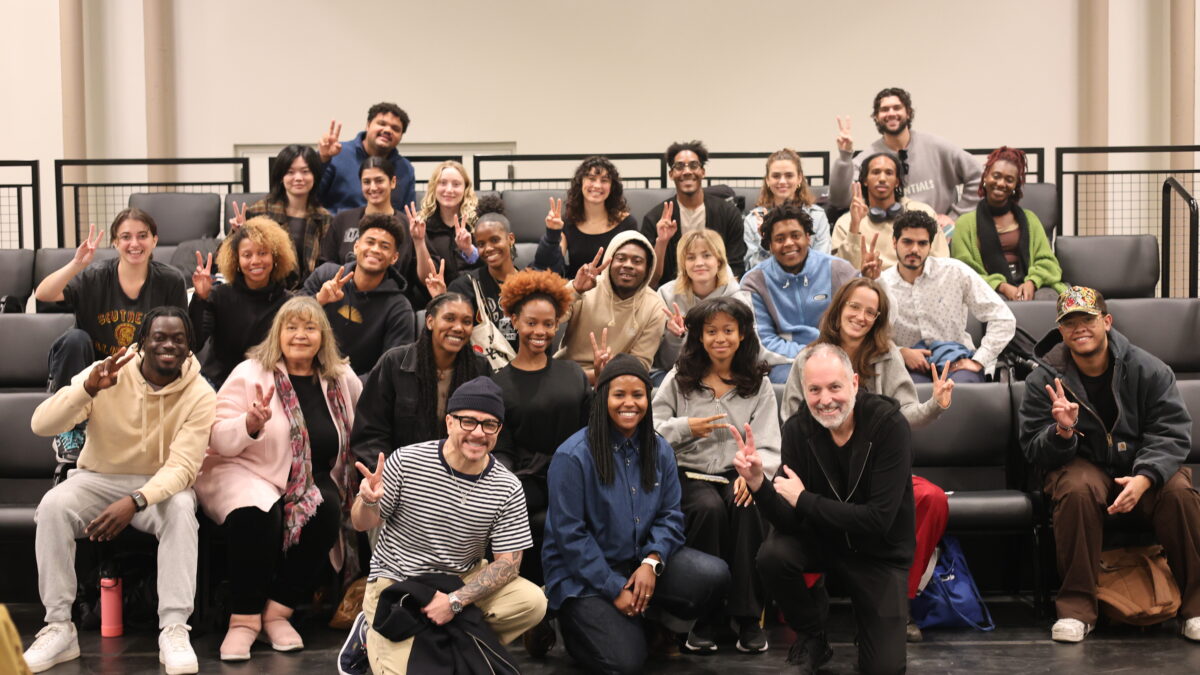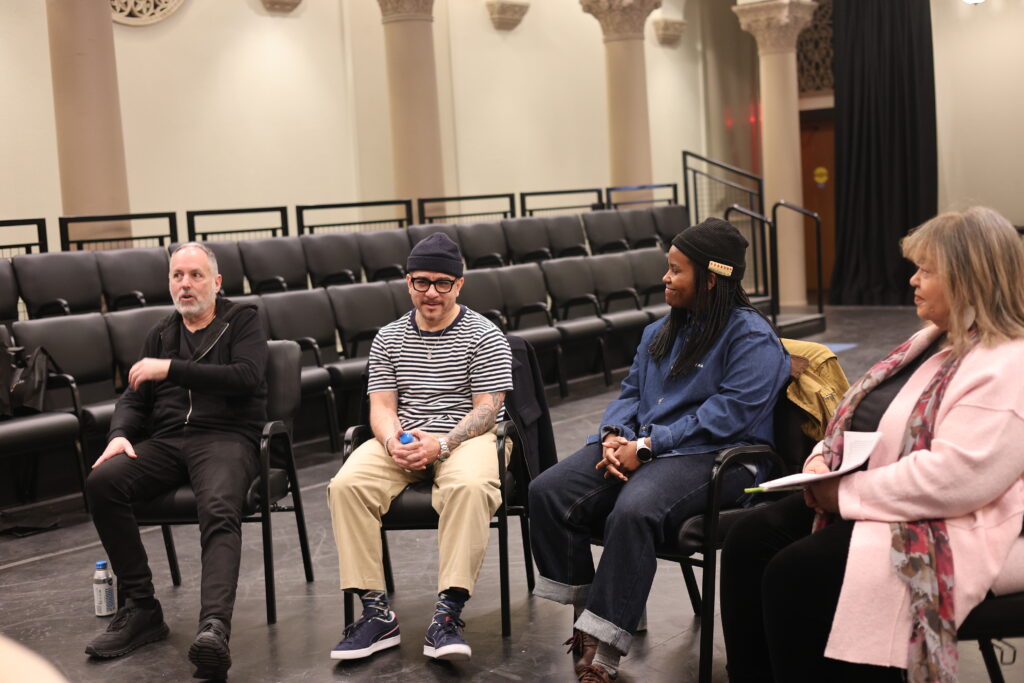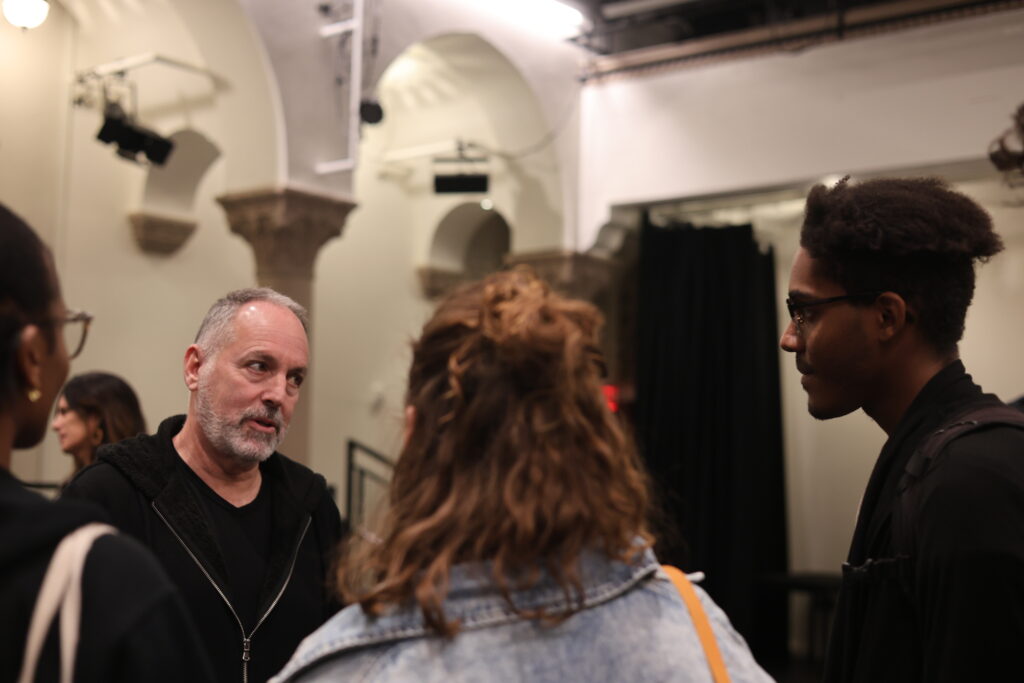
Screenwriter Virgil Williams, Producer Todd Black (BFA '82) and Executive Producer Katia Washington pose with MFA Acting students in the Sanctuary Theatre. Photo by Leslie Sanchez.
“If you think you can do it alone, you will lose. I promise you, you will lose.”
Veteran producer and USC School of Dramatic Arts Alumnus and Board of Councilors member Todd Black (BFA ’82; The Pursuit of Happyness, Ma Rainey’s Black Bottom) punctuated these words in front of an intimate audience of MFA Acting students, highlighting the importance of teamwork and collaboration in making cinema. The sentiment was underscored by the people sitting next to him: Executive Producer Katia Washington (Malcolm & Marie, Fences) and screenwriter Virgil Williams (Mudbound, A Journal for Jordan), who worked alongside Black on bringing August Wilson’s brilliant play, The Piano Lesson, to Netflix in 2024.
The trio had stopped by the Sanctuary Theatre in SDA’s new Dick Wolf Drama Center for a chat with Professor Michele Shay—whose connections with Wilson also run deep. In addition to originating the role of Louise in Wilson’s Seven Guitars, she has worked extensively to bring Wilson’s plays to life, including directing an acclaimed SDA production of August Wilson’s King Hedley II in 2023 that became the first SDA production performed at the International Black Theatre Festival in 2024.
The reverence for the legendary playwright was evident throughout the talk.
“If you approach [Wilson’s] work with respect and humility,” said Professor Shay, “there’s a door of awareness of one’s soul that can open up by living in these characters, in [the play’s] language—where he shows you where to go.”
For Katia Washington, tackling Wilson’s work was a family affair. Her father, actor Denzel Washington (who co-produced the film with Black) has vowed to bring all ten plays of Wilson’s famed Century Cycle to streaming platforms. For The Piano Lesson, Katia found herself working alongside both her father and her brother, Malcolm Washington, who directed the film. “[Film is] kind of our family language anyway,” she said. “So coming from that place, it was super easy for us to transition into working together.”

While Washington talked about the various skills and sensibilities needed to become a producer, Black focused specifically on the challenge of bringing Wilson’s works to a modern audience.
“It’s just finding the balance of paying total respect to August Wilson’s The Piano Lesson while trying to bring it into 2024,” Black said. He cited the musical choice of including a Frank Ocean song, 2016’s standout “Wither,” as an example. The song was intended to signal to audiences that, while the content of the film may involve heavy subject matter and delve into American history, the presentation would be modern and entertaining.
“It’s particularly hard with a historic piece. It’s particularly hard with a play. You never want it to feel like it’s medicine or history,” Black said.
Screenwriter Virgil Williams, who wrote the screenplay for the 2024 Netflix film, spoke about adapting Wilson’s words for a modern audience, comparing his work as a writer to the buildings of Chinese American architect I.M. Pei. Pei famously built his glass pyramid at the Louvre in Paris to allow as much light into every corner of the museum as possible.
“Writing is architecture. It’s the same,” Williams said, gesturing to the surrounding Sanctuary Theatre. “When I look at this building and what they kept and what they did, there’s intent and there’s purpose and there’s function connected to that intent.”
Williams pointed out that he approached adapting the screenplay of The Piano Lesson in a similar manner.
“The intent was always to ‘I.M. Pei’ it,” Williams explained. “To make this accessible for now and the future. We had eyes wide open that this was an opportunity to be a link in the chain, to apply for our August Wilson card, to leave a patch in the quilt.”

Just do the work
The second half of the talkback opened the floor to MFA students, resulting in a lively and interactive question and answer session. The Q&A presented a valuable opportunity for the students, who primarily study acting but are also training to be media-agile multihyphenates, to learn from the experience of creatives in other aspects of the filmmaking process.
One student asked Washington and Black to give advice to actors who are curious to try their hand at becoming producers. Washington stressed the importance of developing a personal sense of taste, which often comes from taking in as much art and performance as possible while also having discussions with people who hold differing viewpoints.
“Going to take in art, seeing movies that aren’t necessarily just the top ten box office films, going to the Vista [Theater] to see what they have, going to an art house to see what you can see,” Washington said. “Going to see plays, going to museums. Things like that. And listening to other people who have different tastes than me.”
Black agreed.
“There are so many great actors working today,” he said. “There are so many actors today that have great habits, and you can learn their habits.”
Williams, who started as an actor but later transitioned to screenwriting, urged students to focus on what they can control and not be discouraged if results don’t come right away.
“Just do the work. Do the work. And every time you get a chance to work, get your homework and take it home,” he said. “And then, if you stay in the game, you’re going to put yourself in a position to get called to something, and all these links in the chain we build—you’ll have a nice jewel in it.”
The three creatives agreed that students at the School have a leg up in a competitive industry, because of the various opportunities and advantages provided by SDA. They praised the School for creating opportunities, support and advantages for students in a notoriously competitive industry. “You guys are really, really lucky. [SDA] really has your backs, both while you’re here, and also when you get out,” Black said. “It’s never easy, but it always helps to make it a little easier and create a little more opportunity.”